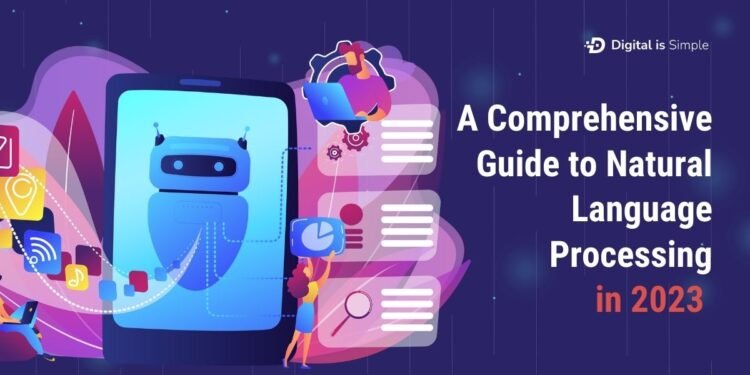NLP is creating quite a buzz in the market. So, conversational chatbots can help your industry to sustain itself in the market. It supports the potential use of AI in the crucial aspects of the industries. Because every sector wants to leverage smart integrations to level up the user experience. Even it facilitates business processes with the simplest languages. Want to know how NLP in AI is beneficial? Let’s dive in to know more.
Why use NLP in AI?
NLP or Natural Language Processing helps to build responses in human languages. It helps to understand the spoken or written human language easily by the system. NLP in AI evolved from computational linguistics and built upon the basic principles. This engineering discipline integrates technology to accomplish the enterprise’s needs.
Apart from daily lives, NLP helps various industries. Such as retail, medicine, real estate, healthcare, finance, etc. You might have seen how smart integrations for user support can enhance your experience. Such as Alexa, Siri, and chatbots for additional queries. Recent sophisticated NLP integrations can amplify the customer experience.
Role of Natural Language Processing in industries

Let’s look at some crucial uses of NLP in the market.
1- Machine translation
The role of NLP in AI supports interaction for various languages in the world. Its input is a human language and gets translated to the target words. You may take the fine example of Google Translate for the machine translation. It improves communication on social platforms for the users. Plus, it approaches the translations to distinguish the languages. So, the system can understand it differently.
2- Sentiment analysis
It is the simplest form to get the marketing done right. It understands the intent of the emotions behind the text. The input of such analytics is the normal text and the response is as per the emotions. So, this probability gets noticed via hand-generated features. And using the NLP in AI can make it more conversational. Such as word n-grams, TF-IDF, deep learning models, etc. It is quite evident on various online platforms for user interaction.
3- Entity recognition
Dividing the entities into predefined categories for accurate results. Such as names, locations, firms, and gender. You can easily insert text and the output is the categorized entities into the divisions. These named entities help to understand the data to summarize and analyze effectively.
4- Grammar correction
NLP also supports correction to detect possible grammar errors. Its sequence-to-sequence task shows the grammatical errors as the output. Grammarly is the best example of the NLP integration for assisting in writing content. It also offers the best suggestions to the users.
5- Spam detection
One of the issues with the identification of email spam. So, NLP also helps to identify such spam without any hassles. So, the benefits of AI also involve marking or identifying spam mail. The NLP smart integration identifies the subtexts, titles, and subjects for correct spam reports. So, Gmail providers or receivers get alerted of unwanted emails. This helps to get the required spam mail in the correct folders.
6- Text generation
NLG or Natural Language generation also gets the good support of NLP. It generates a similar human text. This model in NLP in AI can suggest content per different genres and formats. Such as tweets, captions, blogs, articles, etc. You can opt for Markov, LSTMs, LaMDa, or GPT-2 for this task. Later autocomplete and chatbots can help you with further sentence formation.
7- Autocomplete support
It is the smartest suggestion for NLP integration. As it can complete the sentence by predicting what word can come after the other. It smartly predicts to complete the sentence of your interaction. You might have seen WhatsApp, Google, and Gmail which also use the autocomplete feature. Even it supports the entertainment industry.
8- Chatbot integration
You have seen how retail applications have used chatbot support. It also automates the interaction and solves user queries. So, it supports human interaction easily. It handles:
You can use the database queries using NLP. So, in the conversational AI solutions, it’s easily understood.
- Conversation generation
Chatbot integration can never make a conversation boring. Because it can empower engaging conversation. Such as Google LaMDA which supports your interaction. It offers human-like conversations for level-up interactions.
9- Information retrieval
NLP has always smart support to enterprises. The custom AI solutions match the documents as per the query. So, it eliminates the process of searching and locating. Because the aim is to fetch the results within the time limit.
In this, the Document retrieval system helps in indexing and matching the data. Indexing is completed by vector space model via two-tower networks. And then matching gets done with distance scores. Google supports this search function with the retrieval of text and images.
10- Summarization
Next, we move to the process of summarization. It is the task of simplifying the text to extract the crucial content. Salesforce supports this summarizer to evaluate their facts and data. Summarization has two method classes:
- Extractive summarization
It focuses on extracting the summary of long content. This summarization type stores sentences in a summary format. Use it as an input text and then select some sentences.
- Abstractive summarization
Quite a different method of summarizing. It paraphrases the content to form an abstract. It can have words that are not in the sentence. Abstractive summarization follows a sequence-to-sequence task. You can get top AI consultant companies for your help. That means input is a full-fledged document but output is an abstract.
11- Question answering
Another crucial task that affects the human interaction is the Q/A. It’s not about the testing but deals with the precise answer. Such as in the AI development solutions asked questions related to crucial events. It comes down to two types:
In this, you get a full-fledged choice to pick one as your answer. The NLP helps to pick the correct answer for the questions.
This model deals with answering it in natural language processing. You don’t get the options instead a query helps to extract the texts.
Use cases for NLP in AI

Here are some industries that use NLP for tech-driven growth.
The financial sector is quite loaded with information in different formats. It has a lot of data to offer for analytics. Data analysts for this sector integrate NLP to empower automation. It cuts down the time of the mundane tasks. Because it automates the data capturing, calls, and evaluation process.
Even the stock traders use NLP to make smart decisions by analyzing the stock market. NLP-powered markets offer predictions via news and social media. This insurance sector uses NLP to build and test these products. So, it supports the finance traders and the users of the market.
After the finance sector, the legal sector also integrates NLP to empower the space. Legal service deals with information-heavy data regularly. Because there are many receivers and senders of this information. Although the documents in the offices may be under heavy piles of dust. However, modern technology has helped the understanding of the fundamentals of AI information.
Law firms deal with testimonies and legal forms. So, the latest technical inventions support traditional court proceedings. NLP automates time-consuming and mundane tasks. Because the manual support may produce some errors or unproductivity. However, NLP in legal proceedings can make your work completed in minutes.
Chatbot integration for user support offers support for the growth of your business. And if you include NLP in AI it can level up the interactions. And it is the fastest-growing use case of the NLP. Because NLP in chatbots offers heightened interactions to solve the basic queries.
It takes the users as the center of the conversation. And uses conversational AI solutions to support your user queries at the time. There are many chatbots like Google, Siri, or Microsoft Assistant that support your queries. Especially when practicing medical emergencies with patients.
A chatbot app developed with NLP can support multiple queries in one go. Patients can easily seek assistance, users can ask queries and other support. NLP also reduces the risks and errors from such interactions.
Last but not least. Sales & marketing is the crucial sector to the market. It has a wealth of public data and feedback. But if this is done manually then there is a lot of time needed. So, NLP in AI is the best decision to make in this situation. Because NLP helps to analyze this data by getting the input and applying automation.
Even it uses social media, google, and reports for in-depth study. It even supports sentient analysis and information retrieval. NLP models can easily specify features of products. And it can support understanding the test user demand. Marketers can use this smart NLP to make informed decisions to run successful campaigns.
The retail industry showcases various uses of NLP at different points. The use of a VR assistant can help to get the user the best solution in real-time. Chatbots remain the center point from the user’s perspective. Also, it can offer suggestions to support quick purchases by h the users.
Conclusion:
NLP is quite a smart tech integration to support industries. Also, the mentioned above pointers offer you a brief of all the uses of NLP in enterprises. For more consideration, consult the top AI consultant companies for your projects.
FAQs
-
Uses deep learning in natural language processing?
NLP blends statistical, machine learning, and deep learning models with computational linguistics—rule-based modeling of human language.
-
What will the future of NLP entail?
In industries like education, healthcare, and customer service, where it can boost efficiency and produce more individualized experiences, NLP will continue to find applications. Because of this, natural language processing seems to have a bright and promising future.
Financial and banking companies can utilize sentiment analysis to examine market data, decrease risks, and improve judgments.
















